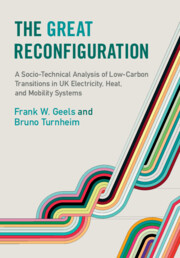Crossref Citations
This Book has been
cited by the following publications. This list is generated based on data provided by Crossref.
Linke, Simone
Erlwein, Sabrina
van Lierop, Martina
Fakirova, Elizaveta
Pauleit, Stephan
and
Lang, Werner
2022.
Climate Change Adaption between Governance and Government—Collaborative Arrangements in the City of Munich.
Land,
Vol. 11,
Issue. 10,
p.
1818.
Büscher, Monika
Cronshaw, Cronan
Kirkbride, Alistair
and
Spurling, Nicola
2023.
Making Response-Ability: Societal Readiness Assessment for Sustainability Governance.
Sustainability,
Vol. 15,
Issue. 6,
p.
5140.
Ruess, Patrick
2023.
Smart City Replication Engineering: A Conceptual Framework.
p.
14.
Nykamp, Hilde
Andersen, Allan Dahl
and
Geels, Frank Willem
2023.
Low-carbon electrification as a multi-system transition: a socio-technical analysis of Norwegian maritime transport, construction, and chemical sectors.
Environmental Research Letters,
Vol. 18,
Issue. 9,
p.
094059.
Wells, Peter Erskine
2023.
System confluence and the reinvention of automobility.
Proceedings of the National Academy of Sciences,
Vol. 120,
Issue. 47,
Andersen, Allan Dahl
Geels, Frank W
Coenen, Lars
Hanson, Jens
Korsnes, Marius
Linnerud, Kristin
Makitie, Tuukka
Nordholm, Amber
Ryghaug, Marianne
Skjolsvold, Tomas
Steen, Markus
and
Wiebe, Kirsten
2023.
Faster, broader, and deeper! Suggested directions for research on net-zero transitions.
Oxford Open Energy,
Vol. 2,
Issue. ,
Geels, Frank W.
Kern, Florian
and
Clark, William C.
2023.
Sustainability transitions in consumption-production systems.
Proceedings of the National Academy of Sciences,
Vol. 120,
Issue. 47,
Moore, Trivess
and
Doyon, Andréanne
2023.
A Transition to Sustainable Housing.
p.
147.
Geels, Frank W.
Kern, Florian
and
Clark, William C.
2023.
System transitions research and sustainable development: Challenges, progress, and prospects.
Proceedings of the National Academy of Sciences,
Vol. 120,
Issue. 47,
Cândido, Luis Felipe
Lazaro, Jose Carlos
Freitas e Silva, Adriano Olivier de
and
Barros Neto, José de Paula
2023.
Sustainability Transitions in the Construction Sector: A Bibliometric Review.
Sustainability,
Vol. 15,
Issue. 17,
p.
12814.
Turnheim, Bruno
2023.
The historical dismantling of tramways as a case of destabilisation and phase-out of established system.
Proceedings of the National Academy of Sciences,
Vol. 120,
Issue. 47,
Little, Vicki Janine
Ho, Helen Hui Ping
and
Eti-Tofinga, Buriata
2023.
Not WEIRD at all! Towards More Pluralistic Economies and Sustainable Livelihoods.
Journal of Macromarketing,
Vol. 43,
Issue. 2,
p.
190.
BENTOUATI, Bachir
HACHANI, Kelthoum
CHETTIH, Saliha
and
EL-SEHIEMY, Ragab
2023.
A Chaotic Krill Herd Technique for Solving Combined Economic Emission Dispatch.
Electrotehnica, Electronica, Automatica,
Vol. 71,
Issue. 2,
p.
68.
Rodrigues, Joab Antonio Martins
Cândido, Luis Felipe
Lima, Sérgio Henrique de Oliveira
and
Alexandre, Alan Michell Barros
2023.
Barriers and Drivers to Adoption of Water Reuse In Buildings: A Sociotechnical Analysis in Ceará, Brazil.
Revista de Gestão Social e Ambiental,
Vol. 18,
Issue. 1,
p.
e04272.
Blümel, Linda
Siegfried, Konrad
Riedel, Fabian
and
Thrän, Daniela
2023.
Are strategy developers well equipped when designing sustainable supply chains for a circular bio-economy? Supporting innovations’ market uptake in a PESTEL + I environment.
Energy, Sustainability and Society,
Vol. 13,
Issue. 1,
Johnstone, Phil
and
Schot, Johan
2023.
Shocks, institutional change, and sustainability transitions.
Proceedings of the National Academy of Sciences,
Vol. 120,
Issue. 47,
Pearson, Peter J. G.
and
Watson, Jim
2023.
The unfolding low-carbon transition in the UK electricity system.
Proceedings of the National Academy of Sciences,
Vol. 120,
Issue. 47,
Hess, David J.
2023.
Conflict and uneven development in the multidecade distributed solar energy transition in the United States.
Proceedings of the National Academy of Sciences,
Vol. 120,
Issue. 47,
Patterson, James
and
Paterson, Matthew
2024.
Embracing the politics of transformation: Policy action as “battle‐settlement events”.
Review of Policy Research,
Schrape, Jan-Felix
2024.
Distributed Innovation Processes. Key Concepts, Case Studies, Current Developments.
SSRN Electronic Journal,



